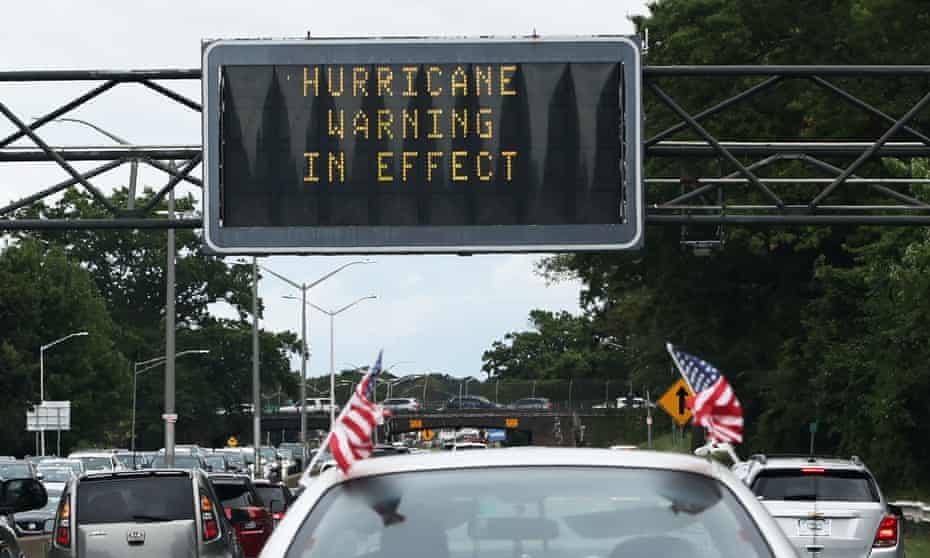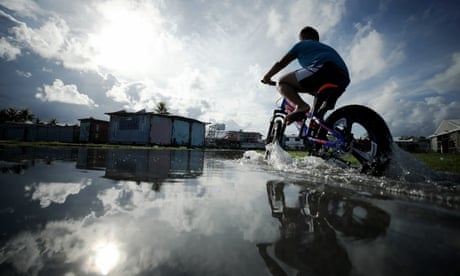Extract from The Guardian
António Guterres says entire planet should be covered by early warning systems within five years.

A road sign flashes a hurricane warning on the eve of landfall by Hurricane Henri on 21 August 2021 in Valley Stream, New York.
About a third of people around the world are not now covered by early warning systems, but in Africa the problem is greater, with about six in 10 people lacking such warnings.
As climate breakdown takes hold, more people are likely to be affected by extreme weather, including flash floods, heatwaves, more violent storms and coastal storm surges, made worse by sea level rises.
António Guterres said it was unacceptable that so many people were still not covered by early warning systems, and pointed out that the Intergovernmental Panel on Climate Change had recently found half of humanity was “in the danger zone” for climate breakdown.
He said: “Human-caused climate disruption is now damaging every region. The most recent report of the Intergovernmental Panel on Climate Change details the suffering already happening. Each increment of global heating will further increase the frequency and intensity of extreme weather events.”
Guterres has frequently called for half of the climate finance provided from rich to poor countries to be devoted to helping them adapt to the impacts of the climate crisis. At present, the vast majority of such finance goes to helping middle-income countries reduce their greenhouse gas emissions, while adaptation efforts are hard to finance.
Guterres said: “We must invest equally in adaptation and resilience. That includes the information that allows us to anticipate storms, heatwaves, floods and droughts.”

Ensuring the global population is covered by such warnings would cost about $1.5bn (£1.14bn) over five years, according to UN estimates. The UN hopes some funding will be forthcoming from the World Bank, and other multilateral development banks, and from development aid from rich countries, and is seeking private sector contributions, for instance from technology companies with expertise in providing data.
Guterres has asked the World Meteorological Organization to lead the effort to ensure everyone is covered by an early warning system. He has called for a plan on how to fulfil the target to be brought to the next UN climate summit, Cop27, to be held in Egypt in November.
Having access to early warnings, even of only 24 hours, can reduce the damage from storms by about a third. The economic benefits of early warnings are also high: a report in 2019 by the Global Commission on Adaptation found that $800m invested in avoiding losses from climate-related damage could reduce damages by between $3bn and $16bn.
Early warning systems can include storm warnings and high alerts for heatwaves, and in coastal areas broadcasts of high waves or tsunamis. The warnings can be sent by mobile phone, public broadcast systems or media such as radio, television and newspapers.
After the 2004 Indian Ocean tsunami, many Asian countries overhauled their early warning systems, which can include public address systems at beaches and coastal towns to warn of imminent tsunamis.
In the UK, severe weather warnings and flood alerts are given out on broadcast media, and posted on the Environment Agency website.
However, the world’s least developed countries and small island states – many of which face inundation if global temperatures rise by more than 1.5C above pre-industrial levels – have the least coverage of early warning systems.
Fionna Smyth, the head of global policy and advocacy at the charity Christian Aid, said rich countries must do much more. “The fact people who have done almost nothing to cause the climate crisis are still suffering and even dying at the hands of extreme weather underlines the cruel injustice of the climate crisis,” she said.
No comments:
Post a Comment